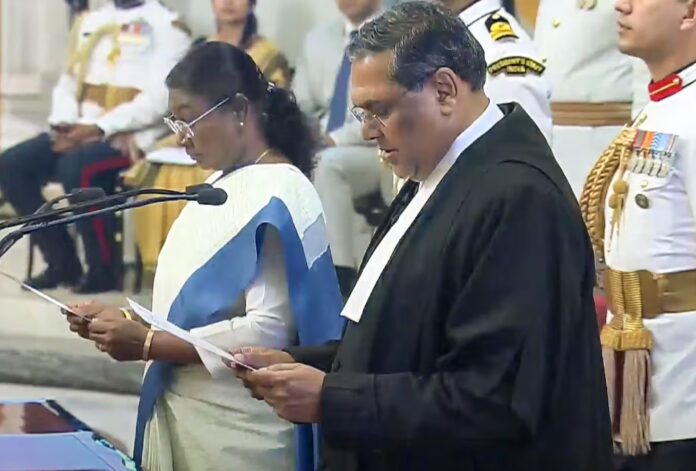
Justice Sanjiv Khanna was sworn in as the 51st Chief Justice of India (CJI) on Monday, taking over from Justice D Y Chandrachud. The oath of office was administered by President Droupadi Murmu in a solemn ceremony held at Rashtrapati Bhavan. Justice Khanna, who was elevated to the Supreme Court in January 2019, is set to serve until his retirement in May 2025, with a tenure lasting a little over six months.
Justice Khanna has a well-established judicial background, having begun his career in 1983 as an advocate with the Bar Council of Delhi. Initially, he practised in district courts at Tis Hazari, later moving to the High Court of Delhi and various tribunals. He served as the senior standing counsel for the Income Tax Department for many years and took up the position of standing counsel (Civil) for the National Capital Territory of Delhi in 2004. He has also acted as an additional public prosecutor and as amicus curiae in several criminal cases at the Delhi High Court.
Justice Khanna was elevated to the position of an additional judge of the Delhi High Court in 2005, later becoming a permanent judge in 2006. During his time at the Delhi High Court, he contributed significantly by chairing the Delhi Judicial Academy, the Delhi International Arbitration Centre, and the District Court Mediation Centres. In addition, Justice Khanna held the role of chairman of the Supreme Court Legal Service Committee in 2023 and now serves as the executive chairman of the National Legal Services Authority. He is also a member of the Governing Council of the National Judicial Academy, Bhopal.
As CJI, Justice Khanna has made tackling judicial pendency a priority, though he is known for keeping a low public profile. He acknowledges the importance of social media but prefers to focus on judicial duties away from the limelight. Justice Khanna is one of the rare judges who was elevated directly to the Supreme Court without previously serving as Chief Justice of any high court.
Justice Sanjiv Khanna comes from a notable judicial lineage; he is the nephew of former Supreme Court judge Justice H R Khanna, who famously propounded the basic structure doctrine in the landmark Kesavananda Bharati case of 1973. Justice Khanna has already left a significant mark during his time as a judge of the apex court, being involved in several high-profile cases.
Among his prominent rulings, Justice Khanna was part of the bench that refused to quash an FIR against a journalist, asserting that Article 19(1)(a) of the Constitution could not override the fundamental right to life guaranteed under Article 21. He was also part of the Constitution Bench that upheld the abrogation of Article 370 of the Constitution and struck down the 2018 electoral bonds scheme. Notably, he delivered a dissenting view in the case involving the Central Vista redevelopment project, reflecting his independent judicial approach. Additionally, Justice Khanna played a role in the recent majority ruling concerning the minority status of Aligarh Muslim University (AMU).
Justice Khanna’s rise to the role of Chief Justice of India marks a significant chapter in the judiciary, with his expertise and experience expected to influence many critical rulings in the coming months. With a background steeped in public service and a focus on judicial efficiency, Justice Sanjiv Khanna’s tenure as CJI is anticipated to address some of the pressing challenges within the Indian legal system.
